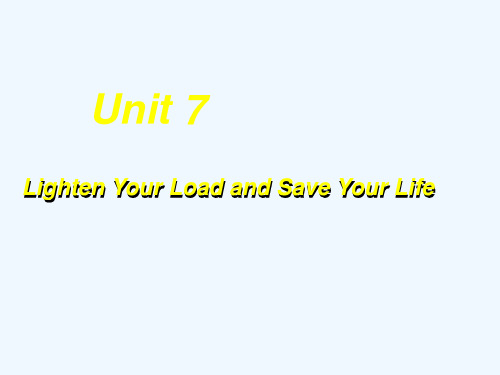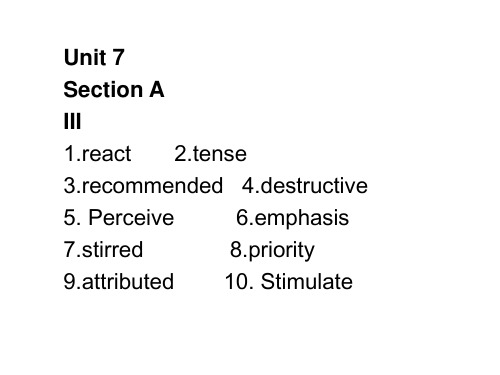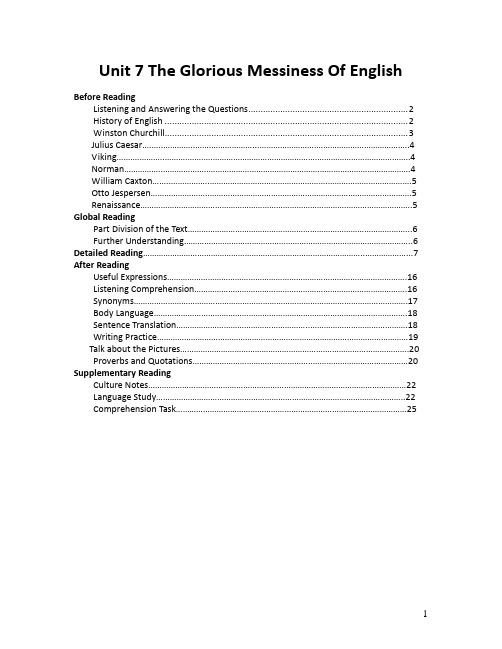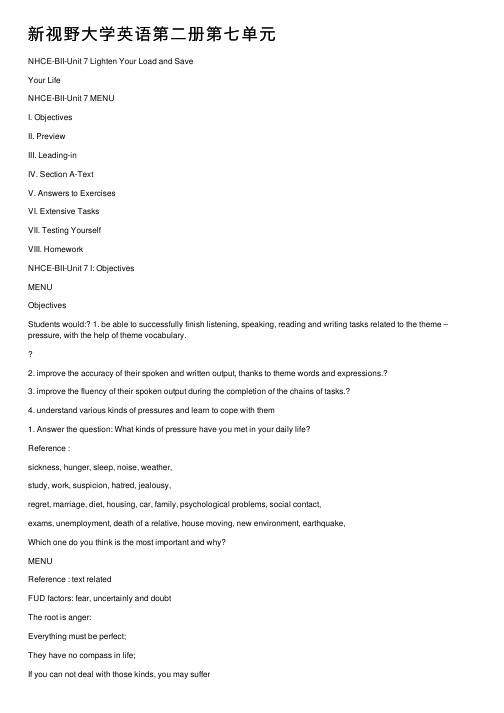新视野大学英语第二册unit7课件(wordsandphrases)ppt
新视野大学英语第二册7单元课文

Unit7▲overwhelm vt. 1.使不知所措, (感情上) 使(某人)受不了2.胜过,击败spin v. 1.(使)迅速地旋转 2.纺线,纺纱,纺织n. 旋转title vt. 给(书、文章等) 取名n. 1.名称,题目2.称呼,头衔react vi. 1.作出反应,回应 2.反对,反抗reactor n. [C] 原子反应堆,核反应堆tense a. 1.紧张的2.拉紧的,绷紧的v. (使)紧张,(使)绷直▲cholesterol n. [U] 胆固醇excess a. 额外的,附加的n. 无节制,过量fiber (英fibre) n. [C, U] 纤维,纤维物质circuit n. 1.电路2.环道,环形道worm n. [C]虫,蠕虫pump n. 泵vt. (用泵)抽吸(或运送)attribute vt. 把……归因于,把……归咎于n. 特性,属性exterior n. 外部,外面,外表a. 外部的,外面的,外表的interior n. 内部a. 内部的▲destructive a. 破坏的▲perfection n. 完美,十全十美,尽善尽美perfectionist n. 力求完美者,完美主义者,凡事求全者delegate vt. 1.授权,委托权限 2.选派代表n. 代表cycle n. 1.循环,周期2.自行车(脚踏车),摩托车vi. 骑自行车emphasis n. 强调jam n. 1.堵塞2.[U] 果酱vt. 把……塞入,挤入vi. 卡住,轧住argument n. 1.争论,争吵 2. 论据,论点,理由stir v. 1.搅和,搅拌,拌匀 2.使激动,惹起,激起n. 1.搅和,搅拌2.激动;骚乱,动乱outlet n. 1.发泄(精力、感情)的方法 2.出口▲physiological a. 生理的,生理学的physiologically ad. 生理上,在生理学上recommend vt. 1. 建议,劝告 2.推荐,举荐financial a. 财政的,金融的financially ad. 在金融上,在财政上independent a. 1.独立的,自主的,自立的 2.无偏见的,中立的stimulate vt. 刺激,激励,激发temper n. 1.心情,情绪2.性情,脾气vt. 使缓和,软化,调和priority n. 1.优先处理的事 2.居先,优先(权)viewpoint n. 观点,看法troublesome a. 令人烦恼的,麻烦的,使人痛苦的politician n. 1.政客 2.政治家deadline n. 最后期限flee v. 逃跑,逃避,逃逸Phrases and Expressionsbe out of control 失去控制,不听约束blood pressure 血压blow one's top 大发雷霆stir in one's own juice 受煎熬blow apart 爆炸on one's trail 在……路上cut down 减少……的数量keep sth. in mind 记住◆workaholic n. 闲不下来的人,工作狂dimension n. 1.方面,特点 2.尺度(宽,长,厚,高)dimensional a. (构成复合词的)有……维的,……方面的constant a. 1.经常的,永恒的,不断的 2.不变的,固定的constantly ad. 经常地,不断地drunk a. 1.(酒)醉的 2.陶醉(于)consequence n. 1.结果,结局,影响2.重要性system n. 1.制度,体制;一套(工作)方法2.系统,装置sanction vt. 批准,认可n. 1.批准,认可2.约束力,约束因素workaholism n. 醉心工作,迷恋工作employee n. 雇员,被雇佣的人employer n. 雇主loyal a. 忠诚的,忠贞的hazard vt. 1.使遭受危险,冒险2.冒险做出;大胆提出n. 危险;风险trap vt. 1.使陷于困境,使落入圈套,使受限制 2.设陷阱捕捉n. 1.陷阱,捕捉机2.圈套,诡计consumption n. 1. 消耗,消费 2. 消费量,消耗量mode n. 方法,方式merchant n. 商人rack vt. 使(肉体或精神)受痛苦,使受折磨,给……造成麻烦(此词在文中与up连用,意义为"积累"。
全新版大学英语2 unit7PPT课件

more previous back index break over
Unit 7: Learning about English
tolerance
NCE-B2
n. followed by of/for
1) 容忍,宽容 2) 忍耐
massive
NCE-B2
a. large in scale, b.amount, or degree
The ancient temple’s massive stone pillars had begun to crumble.
她喝了大量的烈性酒。
She drank a massive amount of alcohol.
Unit 7
Learning about English
Text A The Glorious Messiness of English
Unit 7: Learning about English
NCE-B2
1. The text can be divided into three parts. Now write down the paragraph numbers of each part (Part Two has been done for you) and its main idea:
科学家们呼吁国际社会创立国际准则来禁止克隆人类
Scientists called on the international community to create an international convention to ban human cloning.
新视野大学英语视听说(第二版)第二册_UNIT_7

手头紧
Book 2 – Unit 7
to tight purse strings
Viewing, Listening & Speaking
Brainstorming
C. Work with your group members to list as many things that people can get and not get with money as possible.
财大气粗;有钱就有势力;有钱能使鬼推磨。 金钱是万恶之源。 Money is the root of evil. 贪小失大;贪便宜,吃大亏; Penny-wise and pound-foolish. 小事精明,大事糊涂。
Money talks. Save your pennies for a rainy day. A penny saved is a penny earned.
American Coins General names English Coins 2 pence 5 pence 10 pence 20 pence 50 pence 1 pound Chinese Coins 1 fen 5 fen 1 jiao 2 jiao 5 jiao I yuan
1 cent 5 cents 10 cents 25 cents 50 cents 1 dollar
Lead-in Questions for groups 1 and 2:
1. Is money the most important thing in your life? If not, what is it and why? 2. If you have a million dollars, what would you do with it?
新版新视野大学英语第二册第七单元课件

and-effect
7~11 major causes of the stress in life
direct quotation
12~20 the steps to cope with examples+
the stress
quotation
27
Text Study—Structure Analysis
11
Text Study Notes to the Text Words and Expressions Idea Sharing Writing
27
Understanding Structure Analysis Summary Reproduction
27
Text Study—Understanding
B. The way to develop paragraphs:
chainlike cause-and-effect
To make his idea more convincing, the author adopts the findings of researchers to explain how excess stress affects one’s heart through a chain of causes and effects.
27
Text Study—Reproduction
Points to cover:
• Exchange of greetings. • Necessary inquiry about the patient’s life style,
job, present engagement … • Harmful effects of getting stressed. • How to manage stress effectively.
新视野大学英语视听说教程2第三版BOOK2 UNIT7(ppt课件)

Speaking for communication
Further practice in listening
Wrapping up
Fun time
学习交流课件
2
Learning objectives
1 talk about technology around as
2 listen for agreement and disagreement
UNIT 7
Time of technology: A b学习le交流s课件sing or a curse? 1
Unit 7 Time of technology: A blessing or a curse?
Learnstening to the world
学习交流课件
7
Opening up
1 Work in pairs and discuss the questions. How often do you and your partner do these things? Write O for often, S for sometimes or N for never. Then discuss your answers with your partner.
学习交流课件
6
Opening up
1 Work in pairs and discuss the questions.
How often do you and your partner do these things? Write O for often, S for sometimes or N for never. Then discuss your answers with your partner.
新视野大学英语第二册unit7

His dark eyes shone like polished glass; his arms and legs moved unexpectedly, as if attached to unseen wires. Meaning: His dark eyes are very bright; he moved his arms and legs suddenly as if they were connected to hidden wires. 他深色的眼睛里闪着光,好似擦亮了的玻璃; 他手臂和双腿毫无预示地移动着,就好像是 连着看不见的电线似的。
Sequential Actions
1. pull into the garage (5) 2. put his pistol between my eyes (8) 3. toss my house keys into a bush (3) 4. note details of their faces (2) 5. rip the watch from my wrist (7) 6. speed away (1) 7. take a description of the robbers (4) 8. look through mug shots (6)
wallet
watch
KFC chicken
Reading and Understanding
Requirement: read this the Actions in Sequence
1) speed away (6) 2) note details of their faces (4) (3) 3) toss my house keys into a bush 4) take a description of the robbers (7) 5) pull into the garage (1) 6) look through mug shots (8) 7) rip the watch from my wrist (5) 8) put his pistol between my eyes (2)
Unit7新视野大学英语第二册

Unit7新视野⼤学英语第⼆册Teaching Plan for Unit 7(In New Horizon College English Book 2)I. Time:10 class hoursII. Contents:Listening and SpeakingSection A: Lighten Your Load and Save Your LifeSection B: Are You a Workaholic?III. Suggested Timetable:1.The first two-class-hour session for listening and speaking (Unit 7 in College English Listening and Speaking Course Book 2 ).2.Next four-class-hour session for Section A3.The fourth two-class-hour session for exercise of Section A4.The fifth two-class-hour session for Section B and Section CIV. Aims and Requirements:Listening and Speaking:1.Train the students’ability to understand the main idea and grasp important details of the listening texts.2. Give the students a chance to exchange views on the texts they have heard to enable them to have a deeper understanding of the texts.Section A : Lighten Your Load and Save Your Life1. Help students understand how to get rid of stress in their life.2. Understand the structure of the text and the devices for developing it.3. Grasp some keys words, phrases and some useful sentence patterns.Section B: Are You a Workaholic?1.Reading skill: Finding Out Word Meanings2.Sentence patterns & Language pointsV. Focal Points and Difficult Points:Listening and Speaking:1.Enable students to be familiar with the passage listening skill2.Grasp some words and expressions which often appear in CET-4Section A : Lighten Your Load and Save Your Life1. Organizing the composition according to problem—analysis—solution.2. Key words, phrases and some useful sentence patterns3. The principle of end-weight in the sentenceSection B: Are You a Workaholic?Practice reading skills: Finding out the meaning of an unfamiliar word from clues provided by context.VI. Suggested Teaching Procedure and Methodology:Listening and Speaking: ( an interactive approach is introduced)1. Pre-listening Task:arrange the students in pairs and ask them to discuss the followingquestions:①Which is most important to you in deciding what to by, brand name, quality, or price? Why?②Do you spend much money on fashion?③What kind of cloths do you like to wear?2. Background informationFashion, in most cases, refers to the styles of clothing, hairstyles, etc. that are popular at a particular time. Fashion changes quickly. For example, mimi-skirts were all the fashion in the 1960s. Many people, especially women and the young, like to follow the fashion, which is usually set by famous film stars, pop singers, models. People’s attitude towards fashion differs from one to another. Some people think changing fashion is nothing but a waste of time and money. Others think it can make the world more colorful and beautiful. Well-designed clothes can make one feel good and can reflect one’s personality.3.Listening to text 1 and 24.Speaking Tasks: ask the students to get into pairs and explain to them how to carry outSpeaking Task A- Reflections on the texts, then select a pair to present their views in class.Section A: Lighten Y our and Load Save Your Life1. Background information①Dr. Robert S. Eliot, the author of the book②The University of Nebraska: The university has four campuses. Its main campus is located inLincoln, where colleges of arts and sciences, agriculture, education, architecture, engineering, and technology, business administration, home economics, journalism, and law are housed. ③Benjamin Franklin, a famous American of the 1700’s best known for experiments withelectricity and nature, using kites.2. Pre-reading ActivitiesListen to short passage twice and answer questions①What causes stress?②What are the NICE factors? Why are they important?③How do we follow Ben Franklin’s example?听⼒原⽂:Stress can kill you. Being tense can damage your heart so it is wise to take charge of your life and realize you cannot control everything. But you can control stress which is caused by fear, uncertainty, doubt and lack of control. Anger may be the root of this stress, especially for hardworking professional women and people with no goals in life. To relax and take control, try the NICE factors: new, interesting, challenging experiences. And follow Ben Franklin’s example by writing down the major goals you want to achieve in your life. For the problems over which you have no control, you have to go with the flow. Answers:①What causes stress?Reference key: Fear, uncertainty, doubt and lack of control②What are the NICE factors? Why are they important?Reference key: New, interesting, challenging experiences are NICE factors./ To relax and take control.③How do we follow Ben Franklin’s example?Reference key: Writing down the major goals you want to achieve in your life.3.Work on Section AA)Structure of the Text ( a method of analyzing the text structure is employed)Part I (Paras.1-7) The relation between stress and health discovered by Dr. Robert S. Eliot.Part II (Paras. 8-11): The roots of stress.Part III (Paras. 12-20): The ways of lightening the load.B) Raise some questions to make students grasp some detailed information in the text(question and answer method is used)Part I (Paras.1-7):Questions:- According to Dr. Robert S. Eliot, what should you do if you don’t want to break your heart?- For those who are called “hot reactors”, what may be the result of being tense?- What main factors, according to Eliot, cause harmful levels of stress?Answers: -You should learn to take charge of your lives and recognize there are many things beyond your control. (Para. 2) -Being tense may cause tremendous and rapid increases in their blood pressure. (Para.4)-Fear, uncertainty and doubt, together with the lack of control. (Para.7)Part II (Paras. 8-11): The roots of stress.Question: -What kinds of people does the author mention to illustrate “the root of their stress is anger”?Answer: -One kind is professional women, the other kind is people who have no “compass in life”. . (Para.9)Part III (Paras. 12-20): The ways of lightening the load.Questions: -What new factors does Eliot recommend in order to calm yourselves down?-What does the example of Ben Franklin show?-From Eliot’s viewpoint, how do we face all the problems and difficulties in our dailylivesAnswers:-The NICE factors–new, interesting, challenging experiences. . (Para.13)-The example shows that you can’t fulfill all your great ambitions, so you have to set your priorities. . (Para.15-18)-We can’t complain or escape. We have to learn how to deal with them. . (Paras.19-20) 4. Language PointsPart I (Paras.1-7)①If you often feel angry and overwhelmed, like the stress in your life is spinning out of control, (Para 1)overwhelm v1.cover (sth./sb.) completely or cause to feel a sudden strong feeling使不知所措, (感情上) 使(某⼈)受不了They were overwhelmed by sadness when their baby died.婴⼉死时他们悲痛欲绝。
新视野大学英语第二册Unit_7_课件(words_and_phrases)

BOOK2
Unit7
among other things
It goes without saying that a peaceful and stable environment, among other things, proves to be of vital importance for China.
BOOK2
Unit7
It ___ you to at least 50% off the regular price of either frames or lenses when you buy both. (2004. 6. CET4) A. presents B. entitles C. credits D. tips Everyone should be ___ to a decent standard of living and an opportunity to be educated. (2003.1 CET4) A. attributed B. entitled C. identified D. justified
BOOK2
Unit7
spin: vt. & vi. (spun, spinning) 1. casue to move round and round quickly e.g. The top was spinning merrily. 陀螺在轻快地旋转。 My head spun after doing a cartwheel. 做了一个侧手翻后我觉得头昏脑胀的。 2. to draw out and twist (fibers) into thread 纺纱 e.g. Spiders spin threads. 蜘蛛拉网。
新视野大学英语第二册读写教程unit7

Lighten your Load and Save Your Life
Intensive Study
Lighten Your Load and Save Your Lifeห้องสมุดไป่ตู้
1 If you often feel angry and overwhelmed, like the stress in your life is spinning out of control, then you may be hurting your heart. 2 If you don’t want to break your own heart, you need to learn to take charge of your life where you can – and recognize there are many things beyond your control. 3 So says Dr. Robert S. Eliot, author of a new book titled From Stress to Strength: How to Lighten Your Load and Save Your Life. He’s a clinical professor of medicine at the University of Nebraska. 4 Eliot says there are people in this world whom he calls “hot reactors”. For these people, being tense may cause tremendous and rapid increases in their blood pressure.
新视野大学英语第三版读写教程第二册Unit7课文语法讲解

新视野三版读写B2 U7 Text AWoman at the management level1 When Monica applied for a job as an administrative assistant in 1971, she was asked whether she would rather work for a male or a female attorney. "I immediately said a man," she says. "I felt that a male-boss/female-employee relationship was more natural, needing no personal accommodation whatsoever." But 20 years later, when she was asked the same question, she said, "I was pleasantly surprised that female bosses are much more accessible to their employees; they're much more sensitive and intimate with their employees."2 Female bosses today are still finding they face subtle resistance. There is still a segment of the population, both men and, surprisingly, women who report low tolerance for female bosses. The growing presence of female bosses has also provoked two major questions that revolve around styles: Do men and women manage differently, and, if so, is that a good thing?3 Monica is disposed to think so, on both counts. Now a 40-year-old mother of four, she is president of a public sector labor union with 45,000 members. "Relations with my employees are probably different from those of male managers preceding me," she says. "I know what it's like to have to call and say my kid got the mumps so I won't be coming in. I have a more flexible style —not soft, just more understanding." The man who is Monica's assistant agrees, "She tends to delegate more and is always looking for a consensus. People are happy and flourish because they have an inp ut into decisions and they are not mere bystanders; their energies are harnessed. On the other hand, consensus takes longer."4 So, are the differences symbolic or real? Plausible studies suggest that men are typically hierarchical, goal-oriented and feel entitled. Women, by contrast, manage diplomatically, and share power. That point of view is often challenged and argued. Some proclaim that men and women of similar backgrounds, experience and aspirations basically manage in the same way. This view is echoed by younger women, especially those who have encountered little gender discrimination. That was certainly the lesson for Nicole. When her father died of a heart attack, she was an employee at a petroleum products export company. She quit and took over her family's 160-acre fruit farm in St.David's County. On her first day in the field, a workercalled her "darling". "He was trying to test me. I was shaking with anger," says Nicole, now 34. "I stood erect and said, ‗You wouldn't have called my father darling and you're not going to take that liberty with me. If you do, I'll fire you.'"5 When women work for women, a different dynamic often takes over. Susan,a cashier in a Toronto auction house, says that she has explored friendships with some of her female bosses and feels she can rely on them more. While women may feel more at ease with a female boss, men often have to make concessions to the new working styles. Brian, a marine biologist, says, "It took me a couple of years before I felt comfortable enough to relax around a female manager. In fact, my relations with her were much more businesslike."6 To some extent, the male-female differences come down to conflicting styles. One female vice-president discussed the time she burst into tears during a meeting. "Men think that tears are a nuclear weapon in a conventional war. They take exception to a woman crying, inferring that she's feeling unhappy or violated." The men failed to understand that what prompted her tears was not hurt but genuine rage. "When we cry, it's because we have all this valid rage that has no appropriate release," she says."Women cry; men get relief by going on with the offense or by veiling their feelings to appear composed."7 Deborah, president of a firm with its headquarters in Toronto, says that even if men do understand, they sometimes react differently to the identical information and to her cooperative management style.8 Deborah says that her authority is sometimes undermined by perceptions about her gender. "It stems from the whole social context of traditional roles for men and women," she says. "Mom would tell you to do things, but perhaps you wouldn't take as much notice as when Dad told you to do things. Men also have a stronger urge to control," she says.9 For female bosses, the great expectation of some female employees is one more obstacle. Junior women assume a female boss will promote them more quickly than a man would. But, they also expect female bosses to be more self-su fficient. "They ask, ‗Why can't you scan your own stuff?' or ‗Why can't you do your own filing?'" says one senior female executive.10On the other hand, there is no dispute that a few decades ago they would rarely have had a female boss in the workplace.Nina, a management consultant says she's vaguely optimistic. "I'm looking forward to the day, before I die, when we recognize that the best management styles willbe composed of the best that both genders bring to the table ..." Well, she pauses, maybe not before she dies, perhaps in her daughter's lifetime.Language Points:1 When Monica applied for a job as an administrative assistant in 1971, she was asked whether she would rather work for a male or a female attorney. (Para. 1) Meaning: Monica was asked if she would like to work for a male or a female lawyer when she applied for a managing job at a law firm in 1971.Sentence structure note: ―would rather‖句型1 would rather 的意思是―宁愿;宁可;更;最好;还是…为好‖,后接动词原形,表示优先选择的一种方式。
新视野大学英语读写教程第二册unit7课件

新视野 - 短 语 应 用
导入
预习
课文
写作
Back
如果你一离开手机就不知所 措,好像你的生活一刻也离
不开它,你可能已经患了
“手机综合症”。
创 新 应 用
Back
意 群 提 示
If you feel lost with no mobile phone ready at ready at hand / feel lost / not go without / hand, like your life would go for asth. short time without it, then you may develop the for a short time / develop / syndrome mobile phone syndrome.
新视野 - 短 语 应 用
导入
预习
课文
写作
Back
to make things difficult for 短 半途而废: to do things by halves 语 据实而言,他们是在 逆 as things stand 照目前情况: 故意刁难我们。 译 to call things by their name 据实而言:
新视野 - 短 语 应 用
导入
预习
课文
写作
Back
归咎于,归罪于: 心脏病引起的死亡数 归功于: 量的下降一般被归因 归因于: 于饮食上的改善。 归因于:
短 语 应 用
短 语
to blame sth./sb. for sth.
to owe sth. to sb./sth.
to attribute sth. to sth.
《新视野大学英语读写教程》(第二册)Unit 7 Lighten Your Load and Save Your Life

教学参考书 和网络资源
Reference Books and Resources: 1. Teacher’s Book of New Horizon College English 2. Longman Dictionary of Contemporary English (English-Chinese) 3. Oxford Advanced Learner’s English-Chinese Dictionary 4. Longman Dictionary of American English 5. On-line resources: English on line
教
学 过程
1-2 Period
ⅠWarm-up Activity (提问 板书)
1. Group work: Ask some lead-in questions and students can answer the questions according to
their own understanding. 1)What causes stress?
课时安排
第一次课 1-2 period
ⅠWarm-up Activity 1. Group work 2. Questions for thought and discussion
ⅡBackground Information Ⅲ listening Ⅳ watch and Answer Ⅴ Text Analysis
3
1 Dr. Robert S. Eliot Dr. Robert S. Eliot is a cardiologist at the University of Nebraska Medical Center.
第二版新视野大学英语读写教程第二册unit 7课后练习答案PPT

6. I would rather walk there than go by bus.
7. She was held for twenty days and at times she feared for her life.
8. He's been burning the midnight oil for a week now, getting ready for finals.
5.realized
6.socializing
7.privatized 8.characterizes
VIII 1. When you are studying abroad,
misunderstandings can result from cultural differences, among other things. 2. Online learning requires, among other things, commitment and discipline to keep up with the flow of the course. 3. The research work was severely criticized for its poor management, among other things. 4. They discussed, among other things, the future of the oil industry. 5. The article shows, among other things, the negative effects of generation gap between parents and children.
9. For many people the only possible way to escape from poverty is to move to other countries.
全新版大学英语2unit 7课件

Unit 7 The Glorious Messiness Of English Before ReadingListening and Answering the Questions (2)History of English (2)Winston Churchill (3)Julius Caesar (4)Viking (4)Norman (4)William Caxton (5)Otto Jespersen (5)Renaissance (5)Global ReadingPart Division of the Text (6)Further Understanding (6)Detailed Reading (7)After ReadingUseful Expressions (16)Listening Comprehension (16)Synonyms (17)Body Language (18)Sentence Translation (18)Writing Practi ce (19)Talk about the Pictures (20)Proverbs and Quotations (20)Supplementary ReadingCulture Notes (22)L anguage Study (22)Comprehension Task (25)Before ReadingⅠ. Listening and Answering the Questionsⅰ. Listen and Answer(Directions:) Listen to the recording two or three times and then thinkover the following questions.1.What is the passage about?(=English is a great language, but it is also a crazy language.)2.Can you give one or two examples to illustrate the messiness of the English language?(=Yes. For example, the meaning of “your house burns up” is the same asthat of “your house burns down”, or “you fill in a form” is the same as“you fill out a form” .)3.Are you sure of all the idiomatic usages mentioned in the recordedpassage?(= Some of the more confusing usages are explained here:1)ship by truck / send cargo by ship: ship can be either a verb or anounThe first “ship” means “send”, the second one “a large boat”.2) noses that run / feet that smells:This refers to what people usually say “have a running nose”(流鼻涕), “have smelly feet” (臭脚).3) a slim/fat chance: a remote possibility4) a wise guy: a person who pretends to be much wiser thanhe/she really is; a derogatory terma wise man: a really wise person; a commendatory term5) overlook: fail to see or notice, pay no attention tooversee: control (work, workmen)6) hot /cold as hell: extremely hot/cold7) burn up: catch fire and flare upburn down: be destroyed by fire8) fill in a form/fill out a form: synonymous9) go off: start an action, usually accompanied by a great noisego on: continue doing something10) when stars are out: when stars appear in the skywhen lights are out: when lights are turned off11) wind up a watch: tighten the spring of a watchwind up a speech: end a speechⅡ. History of Englishⅰ. The root of EnglishEnglish began as a west Germanic language which was brought to England by the Saxons around 400 A.D. Old English was the spoken and written language of England between 400 and 1100 A.D. Many words used today come from Old English, including man, woman, king, mother, etc. But Old English was very different from modern English and only a few words can be easily recognized. In the 9th and 10th centuries, when Vikings invaded England, Old Norse words, e.g.sky, take and get and many place names, entered the language.From the Norman Conquest (1066) until the late 12th century English was replaced as the official language by Norman French, though English was still used by the lower classes. English from about 1300 to 1500 is known as Middle English. It was influenced by French and also Latin in vocabulary and pronunciation. French brought many words connected with government, e.g.sovereign, royal, court, legal and government itself. Latin was the language of religion and learning and gave to English words such as minister, angel, master, school and grammar.Literature began again to be written in English during this period. One of the most famous Middle English works is Chaucer’sThe Canterbury Tales.ⅱ. The development of Modern EnglishModern English developed from the Middle English dialect of the East Midlands and was influenced by the English used in London, where a printing press was set up by William Caxton in 1476. English changed a great deal from this time until the end of the 18th century.During the Renaissance, many words were introduced from Greek and Latin to express new ideas, especially in science, medicine and philosophy. They included physics, species, architecture, encyclopedia and hypothesis. In the 16th century several versions of the Bible helped bring written English to ordinary people. The Elizabethan period is also famous for its drama, and Sh akespeare’s plays were seen by many people.The development of printing helped establish standards of spelling and grammar, but there remained a lot of variation. Samuel Johnson’s A Dictionary of the English Language (1755) was the first authoritative treatment of English. It defined about 40,000 words and gave examples of their use.By the 18th century American English was established and developing independently from British English. After colonists arrived in the US new words began to be added from Native American languages, and from French and Spanish. In 1783, soon after Johnson’s dictionary was published, Noah Webster’s The Elementary Spelling Book was published in the US. At first it used Johnson’s spellings, but later editions contained m any of what have come to be known as American spellings, e.g. harbor and favorite.ⅲ. 20th Century EnglishDuring the 19th and early 20th centuries many dictionaries and books about language were published. New words are still being added to English from other languages, including Chinese (feng shui) and Japanese (karaoke). Existingwords gain new senses, and new expressions spread quickly through television and the Internet.English is now an international language and is used as a means of communication between people from many countries. As a result the influences on the English language are wider than ever and it is possible that World English will move away from using a British or American standard and establish its own international identity.Ⅲ. Winston Churchillⅰ. A Brief introduction to Winston ChurchillAs a politician, Winston Churchill is remembered as one of Britain’s greatest statesmen. He was the son of the Conservative politician Lord Randolph Churchill and his American wife Jennie. As a young man he served as a soldierin India and Egypt, and as a journalist in South Africa, before entering politics. Churchill became Prime Minister and Minister of Defence in 1940. His radio speeches during World War II gave the British people a strong determination to win the war, especially at times of great crisis. Examples of Churchill’s phrases still often quoted today are “I have nothing to offer but blood, toil, tears and sweat”, and “This was their finest hour”. The Conservative Party led by Churchill lost the election of 1945, but he became Prime Minister again from 1951 to1955 when he retired, aged 80. When he died in Jan 1965 he was given a state funeral.ⅱ. Chronology of Winston Churchill-- November 30, 1874Born Winston Leonard Spencer Churchill at Blenheim Palace, Woodstock,near Oxford.-- October 1, 1911Appointed First Lord of the Admiralty in Liberal government.-- April 30, 1915Failure of the Dardanelles Expedition, in World War I, led to his resignationas First Lord of the Admiralty.-- November 6, 1924Baldwin named him Chancellor of the Exchequer.-- May 10, 1940Appointed to head wartime coalition government.-- July 1945Lost general election.-- April 24, 1953Knighted by Queen Elizabeth II.-- December 10, 1953Awarded Nobel prize for literature in recognition of “historical works andbiographies as well as his brilliant speeches.”-- January 24, 1965Died in London; buried, following a state funeral, in the churchyard at Bladon,near Blenheim.ⅲ. A Video Clip about Winston Churchill(Directions:) Watch this video clip and answer the following questions.1.What do you learn from the clip?2.What do you think of Winston Churchill?Ⅳ. Julius CaesarJulius Caesar was the best-known of all the ancient Roman leaders, and the first one to land in Britain with an army.He did this twice, in 55 and 54 BC, although Britain did not become part of the Roman Empire until nearly a hundred years later.Ⅴ. VikingViking was a member of a people from Scandinavia who attacked parts of northern and western Europe, including Britain and Ireland, in the 8th to 11th centuries. In Britain they were also known as Norsemen. They settled on theScottish islands and in areas of eastern England, and the Danish king Canute ruled England from 1016. The Vikings were feared as violent and cruel, but they were also noted for their skill in building ships and as sailors. They had an important influence on English culture and the English language.Ⅵ. NormanNorman refers to any of the people from Normandy in northern France who settled in England after their leader William defeated the English king at the Battle of Hastings in 1066. The Normans took control of the country, a process known as the Norman Conquest. They used many of the existing Anglo-Saxon methods of government of the state and the church, but added important aspects of their own and made government much more effective. The language of governmentbecame first Latin, and then Norman French, and this caused many new words to be added to the existing English language.Ⅶ. William CaxtonWilliam Caxton was the man who set up the first printing firm in Britain. He printed his first book in 1474. By printing books in English, Caxton had a strong influence on the spelling and development of the language. Many of the books he published were French stories which he translated himself. Ⅷ. Otto JespersenOtto Jespersen was a Danish philologist, grammarian, and educationist. He promoted the use of the “direct method” in language teaching with the publication of his theoretical work How to Teach a Foreign Language (1904). Other books include his seven-volume Modern English Grammar (1909~1949).Ⅸ. RenaissanceThe Renaissance emerged in northern Italy in the 1300s when, not content with the abstract and highly subjective thinking of the Middle Ages, scholars turned for inspiration to the ancient Greeks and Romans with their love of earthly life. Italian architects rediscovered ancient construction techniques and incorporated Greek and Roman columns, arches, and domes into their public buildings. Instead of the flat, stiff figures of the Middle Ages, Renaissance artists portrayed rounded, flesh-and-blood people, people filled with emotions. To depict the world they lived in realistically, Renaissance artists developed linear perspective, which creates on a flat surface the illusion of depth. Renaissance scholars explored their world through mathematics, science, and engineering. Probably the most famous people of the Renaissance times are Leonardo da Vinci and Michelangelo. By the 1500s the Renaissance had spread to Spain and the countries of northern Europe, where people sought to blend the intense interest in human affairs with spiritual ideals.Ⅰ. Part Division of the TextⅡ. Further UnderstandingFor Part 1Pair Discussion(Directions: ) Look at the picture below. Answer these questions with a partner.1.What are differences between English and French in borrowing foreign words?(= 1) English has a vocabulary of about one million words while French hasonly about 75,000 words.2) English has borrowed a lot of words from other language while Frenchhasn’t. And the French government even tries to ban words fromEnglish.)2.What can we infer from the invention of a French word “balladeer”?(= 1) In borrowing foreign words, English people are open-minded while French people are conservative.2) We know the reason why English has become the first truly global language.)3.How did the word “Walkman” come into being?(= The Japanese put two simple English words together to name their product.)For Part 2English – the Sea of Language(略)For Part 3Questions and Answers1.Who is Otto Jespersen?(= He is a Danish scholar.)2.According to Otto Jespersen, what is the cause for English to become what it is?(= It’s the result of the great respecters of the liberties of each individual.)3. What is English language i the author’s opinion?(= English is the tongue of common man.)Ⅰ. Difficult Sentences1. (Title) THE GLORIOUS MESSINESS OF ENGLISH1) Translate the title into Chinese.2) What kind of rhetorical device is used in the title?( =1) 英语中绚丽多彩的杂乱无章现象.2) The rhetorical device used here is called oxymoron (矛盾修饰法). An oxymoron puts two contradictory terms together to puzzle the reader, luring him/her to pause and explore why. Here “Glorious” is a commendatory(褒义的) term, while “Messiness” is derogatory(贬义的). As the reader reads on, he/she will know that English is messy, but the messiness reflects some commendable qualities of English, such as tolerance, t he love of freedom, and the respect for others’ rights. At this point the reader cannot but admire the author’s ingenuity.)2. (LL. 9~10) … which French kids are supposed to say instead –but they don’t.Paraphrase this part of the sentence.(= French children are expected to say the word “balladeer” instead of “Walkman” but they don’t say it.)3. (L. 14) Such is the glorious messiness of English.What can we know about the author’s attitude towards English from this sentence?(= He thinks much of it.)4. (LL. 20~21) The history of English is present in the first words a child learns about … (food, water).1. Paraphrase this part.2. Translate this part into Chinese.(=1) The history of English is revealed in the f irst words a child learns about …2) 英语的历史体现在孩子最先学会用来表示…的词汇当中。
新视野大学英语第二册第七单元

新视野⼤学英语第⼆册第七单元NHCE-BII-Unit 7 Lighten Your Load and SaveYour LifeNHCE-BII-Unit 7 MENUI. ObjectivesII. PreviewIII. Leading-inIV. Section A-TextV. Answers to ExercisesVI. Extensive TasksVII. Testing YourselfVIII. HomeworkNHCE-BII-Unit 7 I: ObjectivesMENUObjectivesStudents would:? 1. be able to successfully finish listening, speaking, reading and writing tasks related to the theme –pressure, with the help of theme vocabulary.2. improve the accuracy of their spoken and written output, thanks to theme words and expressions.?3. improve the fluency of their spoken output during the completion of the chains of tasks.?4. understand various kinds of pressures and learn to cope with them1. Answer the question: What kinds of pressure have you met in your daily life?Reference :sickness, hunger, sleep, noise, weather,study, work, suspicion, hatred, jealousy,regret, marriage, diet, housing, car, family, psychological problems, social contact,exams, unemployment, death of a relative, house moving, new environment, earthquake,Which one do you think is the most important and why?MENUReference : text relatedFUD factors: fear, uncertainly and doubtThe root is anger:Everything must be perfect;They have no compass in life;If you can not deal with those kinds, you may suffera lot, then what will you suffer?MENUReference : text relatedHurt the heart: crazy heart rhythmstremendous and rapid increases in blood pressure; Higher cholesterol levels; Then which is the best word to be substitute for stress?MENUReference : text relatedControlThe NICE factors---new, interesting, challenging experienceWhat is youropinion?Discuss withyour partner!MENUMENU2. study the pictures and then answer the question!questionHow to get rid of pressure and relax yourself?MusicComputer games ClubsDancingHikingClimbing mountains PartyShoppingMoviesTraveling Football, badminton, table tennis…EatingCyclingHaving a bath SingingGoing fishingTea house Consuming Communication Playing cards, Majiang Crying SleepingSmokingMENU3. pair work: (listening, watching and discussion)(1)Do you know the name of this famous actor? (2)Do you like him? Why?(3)In which series is he famous for?(4)Tell your partner something about one movie (in which the actor is the hero) you like best.Reference : Handsome, masculine, strong, powerful,Humorous, brave, clever, high technology,007, an intelligence agent, beauties, carsNHCE-BII-Unit 7 Lighten Your Load and SaveYour LifeEnjoy the artilce and show your viewpoint!Stress is an inevitable part in our normal life. Many kinds of things, such as natural disasters, war and death can cause too much stress in our life. But according to a psychologist, on a day-to-day basis, stress may result from the small things: taking an exam, waiting in line, and having too many things to do in a limited time.We all need stress to add flavor, challenge, and opportunity to life, but too much stress can seriously affect our physical and mental well-being, It reduces the body's immunity and harms the brain, If the stress lasts a long time, it may cause physical illness, insomnia, headaches, backaches, ulcers, high blood pressure-even heart disease.When stress does occur, it's important to recognize and deal with it. There ore some methods we can try. A large number of physical activities can reduce anxiety. Shoring our stress with others can be enormously helpful. Making time for fun such as listening to music may be good medicine. Sometimes even crying is on efficient way to release stress.MENUreference words: classified expressions in the text1.Be overwhelmed, spin out of control, take charge of,lighten your load, show excess alarm or stress, attributeto, blow one?s tops, feel guilty, have no compass, giveemphasis to, own anger, stir in one?s own juice, blow apart,calm down, be stimulated intellectually, remain even-tempered, set one?s priority, keep in mind2. Beyond one?s control, out of control, among otherthings, instead of, on the exterior, on the interior,on one?s trail, over timeMENUNHCE-BII-Unit 7 Lighten Your Load and SaveYour LifeMENUHooked by the illusion about smoking,the author?s father, like many other people, got into the bad habit of smoking, only to die from it.Feeling extremely sorry for her daughter and those in Third World countries who also drag away like chimneys, the author appeals to all people to give up smoking.The author feels terrible and wants to weep when seeing her daughter smoke.1. Structure of TextPara.1Para. 2-5Para. 6-8Reference Words:Tremendous and rapid increase in the blood pressure 2. Questions to Comprehension 1) For those who are called ‘hot reactors’, what may be the result of being tense? (Para.4) MENUReference Words:Stressed people, higher cholesterol levels2) According to Eliot, what have researchers found? (Paras.5)MENUReference Words:FUD: fear, uncertainty, doubt3) What main factors cause harmful levels of stress? (Paras.7)MENUReference Words:Anger, find out where the anger is coming from, everything must be perfect?4) What is the root of stress and what is the trick to deal with it? (Paras.8)。
新视野大学英语2 unit7 are you a workaholic?

The disadvantages of workaholism
• 美国心理学家斯宾塞教授指出,“工作狂”属心 理变态,在各单位的低、中级管理人员中尤为常 见。“工作狂”与对工作有热情者有本质区别— 前者往往并不热爱自己的工作,一般很难从工作 中得到快乐,而只是拼命地工作以求某种“心理 解脱”,此外他们在工作中还常常强迫自己做到 “完美”,一旦出现问题或差错便羞愧难当、焦 虑万分,却又将他人的援助拒之门外;而后者则 十分热爱自己的工作,从工作中能获得巨大乐趣, 出现失误时既不会怨天尤人,也不会懊恼不已。 同时也注意与同事和上司协调、配合,因而人际 关系相对融洽。
• 工作狂常常是缺乏条理,总在寻找理由想做得更 多些,没有工作可做时就感到不知所措,想通过 工作来躲避问题。
The distinctions
Workaholic Hard-Working
Be disorganized
Be organized, Focused Get a lot of work done Know when to stop
• • • • • •
北京师范大学心理学院副教授张西超指出,压力成瘾症 最突出的表现可以归纳为以下五点,你也可以借此判断自 己的“压力瘾”究竟有多重多深。 1、无工作不亢奋:工作时有使不完的劲儿,回家后 却提不起精神玩乐,也无法忍受脱离工作过于休闲。 2、对加班加点习以为常:认为只有玩命地工作才能 创造出更多的价值,加班加点永远值得。 3、忙碌过后感到空虚:一项工作完成后茫然不知所 措,唯有借下一段忙碌来寻找“存在感”。 4、一定要把工作带回家:始终无法割舍未完成的工 作,致使在家“加班”成为一种习惯。 5、时间永远不够用:从没有时间陪伴家人,没有时 间与朋友约会,到最后甚至发展到没有时间吃饭和睡觉, 于你而言,工作的时间永远不够用。
